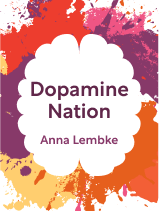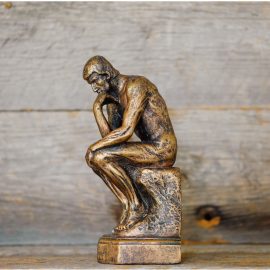

This article is an excerpt from the Shortform book guide to "Dopamine Nation" by Anna Lembke. Shortform has the world's best summaries and analyses of books you should be reading.
Like this article? Sign up for a free trial here.
Looking for an overview of the Dopamine Nation book? What are the author’s main points and takeaways?
In Anna Lembke’s bestselling book, Dopamine Nation, she outlines why and how modern society has primed you to compulsively overindulge in pleasurable activities. Lembke further explains the risks of overindulgence to your mental health and how to manage dopamine addiction.
Keep reading for a brief overview of Anna Lembke’s book, Dopamine Nation.
Dopamine Nation Book Overview
Is there something you indulge in more often than you’d like? Maybe it’s checking social media, eating junk food, or binging shows and movies on streaming platforms. In the Dopamine Nation book, addiction treatment specialist Anna Lembke explores what causes these behaviors and how you can take back control. She explains both the neurological and emotional causes of overindulgence and provides clear actionables to help you stop.
Most people have issues controlling their consumption of pleasurable things—such as junk food, pornography, social media, or binging on their favorite YouTube channels. In her Dopamine Nation book, Lembke draws on contemporary neuroscience and the stories of her patients to take a close look at the reasons for overindulgence and provide clear directives on taking back control of your behavior.
Through a brief overview of Lembke’s Dopamine Nation, we’ll introduce you to the book’s main ideas and takeaways.
The core ideas of the Dopamine Nation book can be broken down into four parts:
- Part #1: Why People Are Driven to Overindulge covers how industrial societies create the perfect conditions for overindulgence.
- Part #2: How Your Brain Chemistry Encourages Overindulgence explains the basics of how your chemical reward system keeps you overindulging.
- Part #3: Working With Your Brain To Overcome Overindulgence covers Lembke’s strategies to restore your brain’s chemical balance.
- Part #4: Overcoming Emotional Obstacles discusses the emotional reasons why people fall into patterns of overindulgence and how to address these issues.
Why & How You’re Driven to Overindulge
In Dopamine Nation, Lembke begins the book by explaining that overindulgence is a widespread and growing issue. She attributes this growth to the interaction of three distinct factors.
Let’s take a look at each factor Lembke identified:
1. Human brains evolved to thrive in scarcity. Your brain is designed to solve the problem of scarce resources. In our early hunter-gatherer days, food and other resources were hard to find, and those who had the strongest motivation to seek it out would have an advantage. Because obtaining pleasurable goods—such as food—results in the release of a neurochemical reward, your brain has evolved a very strong motivation to continue pursuing pleasurable goods.
(Shortform note: To understand why our brains are primed for pursuit of pleasure, it helps to recognize that desire is a much stronger motivator than possession. In Robert Greene’s The Laws of Human Nature, he argues that having something will only provide a brief experience of satisfaction before desire will motivate you to pursue something else. This means your mind’s evolved motivation for neurochemical rewards is perfectly tuned to repetitively seek out a reward.)
2. Industrialization provides abundance. In Dopamine Nation, the book explains how people in industrialized nations now experience an abundance of food, entertainment, narcotics, and other pleasure-inducing goods. The intense motivation to seek neurochemical rewards that served your ancestors so well now leads to overconsumption—your brain still behaves as if you could run out of these pleasurable goods at any moment, and encourages excessive pursuit.
3. Leisure time provides opportunities for overconsumption. In industrial societies, survival requires less daily effort: You no longer have to gather food all day or move every time there’s a drought. The consequent increase in leisure time creates opportunities for compulsive consumption—when you don’t have to spend your time on basic survival, you can redirect that time to pleasurable activities. Hunter-gatherers didn’t have time to play video games all day, but people in industrial societies often do.
Now that we’ve explored how your evolutionary and social circumstances set you up for overindulgence, let’s take a closer look at the role your brain’s natural chemistry plays. Lembke’s Dopamine Nation book explains that the balance of chemicals in your brain can either present enormous obstacles to overcoming overindulgence—or be part of the solution. Understanding your brain’s natural tendencies will help you change your behavior by working with your brain instead of against it.
What Is Dopamine and How Does It Drive Overindulgence?
Contrary to popular misconception, dopamine isn’t the “happy chemical” that releases when you receive something pleasurable—it’s the chemical that motivates you to seek out pleasure. Studies have shown this chemical is largely responsible for overindulgence because it drives you to continually seek out pleasurable activities. Some of the highest dopamine-driven activities include gambling, shopping, sex, and using cocaine or methamphetamines. However, Lembke points out that “high-dopamine activities” are not the same for everyone—the high-dopamine activity that motivates you to indulge compulsively may be something “milder” like sugar, video games, or social media.
Overcoming the Drive to Overindulge
In her Dopamine Nation book, one of Lembke’s strategies for restoring balance is to abstain from your high-dopamine activities for two to four weeks. Remember that repeated indulgence in pleasurable activities induces the brain to balance your seesaw by adding “pain weight.” By abstaining from pleasurable activities—therefore not adding “pleasure weight”—you let your brain recalibrate and take the pain weight off.
However, as Lembke notes, this solution is far from perfect. Abstaining from pleasure requires a lot of self-discipline. The early stages are often accompanied by painful feelings of withdrawal—you’ll have to voluntarily endure this pain without giving into the temptation of relieving it. Once you get through the withdrawal period, you’ll no longer feel the need to indulge.
(Shortform note: Another reason abstaining from pleasure is challenging is because it forces you to work against your habits. In The Power of Habit, Charles Duhigg provides clarity on what makes habits so hard to break. He writes that your brain uses habits to save energy: Once a repeated action becomes automatic, you no longer have to think about it or make a decision. This frees up energy for other activities. When you try to break habits—good or bad—your brain will resist your attempts because it naturally wants to avoid having to expend more energy on decision-making.)
| What Is Dopamine Fasting? The practice of abstaining from pleasure to reset your pain-pleasure balance is widely referred to in popular culture as a “dopamine fast.” Lembke uses the term herself throughout the Dopamine Nation book. However, this term has drawn a lot of criticism—here we’ll explore three of the most common criticisms. 1. Dopamine is essential for your body’s natural functioning, so you can’t actually “fast” from it. Dopamine plays an important role in digestion, kidney function, blood pressure regulation, lactation, and even color sensitivity. While you can decrease the amount of dopamine released in your brain, you can never get to zero—nor should you want to. 2. Some critics contend that dopamine fasting is simply a buzzy rebranding of common sense wisdom that has been around for centuries. Many religious traditions include periods of abstinence such as weekly Sabbath days or longer fasts like Ramadan and Lent. However, defenders of dopamine fasting would point out that if people have been using this strategy for self-improvement across centuries and cultures, that only provides evidence of its value. 3. It’s led to some weird behavior. There are accounts of people avoiding eye contact, conversations, busy streets, and even the smell of food—all to avoid the release of dopamine in their brains. This seems to arise from people believing they need to avoid all activities that could release dopamine. However, Lembke is clear that you mainly need to avoid the activities you engage in compulsively, such as scrolling through social media or eating chips. Unless you struggle with compulsively making eye contact or smelling food, these aren’t things you need to avoid. |

———End of Preview———
Like what you just read? Read the rest of the world's best book summary and analysis of Anna Lembke's "Dopamine Nation" at Shortform.
Here's what you'll find in our full Dopamine Nation summary:
- What causes addictive behaviors and how to take back control
- How pleasure and pain motivate you to consume
- Strategies for keeping your brain’s natural chemicals in balance






